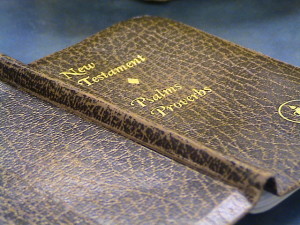 GLENDALE, Ariz. — Officials at a public university in Arizona recently agreed to remove Gideon Bibles from the school’s hotel rooms following a complaint from a prominent professing atheist organization.
GLENDALE, Ariz. — Officials at a public university in Arizona recently agreed to remove Gideon Bibles from the school’s hotel rooms following a complaint from a prominent professing atheist organization.
The Freedom From Religion Foundation (FFRF) sent a letter earlier this year to the CEO of the Thunderbird School of Global Management, which is part of Arizona State University. It said that an employee, who remained unidentified, had contacted FFRF to express their objection to the presence of the Bibles at Thunderbird Executive Inn.
FFRF also asserted that the Bibles violate the Establishment Clause of the United States Constitution, which reads, “Congress shall make no law respecting an establishment of religion.”
“If a state-run university has a policy of providing a Christian religious text to guests, that policy facilitates illegal endorsement of Christianity over other religions and over non-religion,” the letter, written by attorney Madeline Ziegler, read. “Permitting members of outside religious groups the privilege of placing their religious literature in public university guest rooms also constitutes state endorsement and advancement of religion.”
“Providing Bibles to inn guests sends the message that ASU endorses the religious texts,” it asserted. “It sends the message to non-Christian and non-religious guests that the university expects they should read the Bible, and specifically the version of the Bible provided; the Gideon Bible.”
The correspondence also contended that “[r]egardless of whether the Bibles were donated by a private party, the placement of a holy book in guest rooms for guests to read demonstrates government endorsement of a religious message.”
FFRF consequently requested that the Bibles be removed from Thunderbird Executive Inn.
On July 19, CEO Allen Morrison provided notice to FFRF that he had instructed staff to remove of the Gideon Bibles from rooms.
“I have … requested that religious materials be removed from the inn’s guest rooms,” he wrote in the brief correspondence. “I trust that resolves your concerns.”
FFRF, which announced the development on Tuesday, applauded the outcome.
“Anyone zealous enough to need the Bible as bedtime reading will travel with one,” said Co-President Annie Laurie Gaylor in a statement. “The rest of us paying guests seek a vacation from proselytizing when we’re on vacation. What is offensive at private hotels and motels, however, becomes unconstitutional at public-supported rooms.”
As previously reported, FFRF has also convinced the Iowa State University, the University of Wisconsin, Pennsylvania State University, Portland State University and Northern Illinois University to remove Bibles from their guest rooms.
But the religious liberties group Alliance Defending Freedom (ADF) has asserted that FFRF’s contentions are in error.
“[B]y succumbing to FFRF’s demands, you may have exposed yourself … to potential liability. Presumably, your guest rooms include a variety of printed materials, including magazines, phone books, and information about the campus and guest facility,” it explained in a letter to officials at Iowa State University and the University of Wisconsin. “By removing the Bibles because they are religious, you may have engaged in viewpoint discrimination, which is ‘an egregious form of content discrimination’ and a ‘blatant’ violation of the First Amendment.”
Gideons International was founded in 1899 in Janesville, Wisconsin, and first began distributing Bibles in 1908.
“In view of the fact that almost all of the Gideons in the early years of the association were traveling men, the question quite naturally arose regarding how they might be more effective witnesses in the hotels where they spent so much of their time,” the organization explains of its history on its website. “One trustee went so far as to suggest that the Gideons furnish a Bible for each bedroom of the hotels in the United States.”
Gideons International now is active in 190 countries worldwide, and has printed Bibles in over 90 languages.
“Through God’s grace and to His glory, more than 1.9 billion Bibles and New Testaments have been placed through our association, and the work continues,” the group says.
Become a Christian News Network Supporter...


